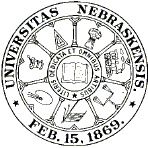
University Studies (University of Nebraska) (1888–1984)
Date of this Version
7-1918
Citation
UNIVERSITY STUDIES, VOL. XVIII JULY-OCT., 1918 Nos. 3, 4
Abstract
The spirit of the Greek drama is preeminently religious. Not only in its beginnings, hut throughout the most flourishing period of its history, it was in intimate connection with the supernatural which entered into its very heart, and constituted one of its essential elements. The theatrical representations at Athens, even in the days of Euripides and Aristophanes, were constituent parts of a great religious celebration. The presence of the supernatural element in Greek tragedy involved a definite attitude toward it on the part of each individual dramatist. The strength of personality which AEschylus, Sophocles, and Euripides possessed made them voice their own conceptions concerning the supernatural. Aeschylus, himself profoundly religious, accepted the popular religion unhesitatingly trying to reconcile it with the more advanced conceptions of his time, by purifying its grossness and harmonizing its various inconsistencies, thus imparting to the religion a new intense vitality. The moral government of all things, the misery and mystery of sin, the power and mysterious dealings of the gods, their terrible and inscrutable wrath, their certain vengeance upon sinners form the background of his thought. A sublime imagihation lifts him to a region where the great forces of the universe seem to be close about him. No poet has surpass. ed him in his power of creative imagination, by which he brings a whole world of mythical figures into being. With amazing impressiveness he presents the dim borderland between the material and the spiritual. With dreams and visions he deals habitually and brings them into his dramatic fabric with consummate skill. At times in his reference to the divine power of Zeus he almost approaches. a stern and sombre monotheism. "One God above all, who directs all, who is the cause of all" (Ag., 163, 1485).
A man of a different spirit, and, although contemporary with Sophocles, a man' of a different world, is E~tripides. The old world was dying, the new world was not yet born. It was an age of intellectual growth, but of religious decay, when most men were disengaging themselves from their traditional belief. The popular religion-the very foundation of tragedy-had been undermined. Scepticism had begun to be busy with the legends which that religion consecrated. Neither Gods nor heroes commanded all the old unquestioning faith, and yet the old religion still kept a real hold on the minds even of the most thoughtful. Under these circumstances the duty of the tragic poet was one of some difficulty, especially as far as the handling of the supernatural in tragedy was concerned.

